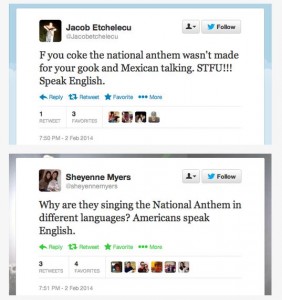As Lew pointed out, Coca Cola Corporation joined in the jingoist party at the Super Bowl by airing a pro-government commercial that included people singing one of the regime’s quasi-religious hymns in a variety of languages. To anyone who doesn’t equate the American government with God Almighty, this was of course silly.
Equally ridiculous, however, was the reaction among some nationalists who disliked the commercial because it wasn’t nationalistic enough. It seems that for some people, you’re only allowed to worship the US government in English. To wit:
Now in spite of their professed love for all things American, I doubt that more than 1 in 100 of these sorts of people could even tell you in what decade the United States Constitution was ratified. Their regard for historical facts is probably less that exacting, but I’ll break the news to them nonetheless. Historically, the United States has never been a place where “we” speak English only. This has never been true as either a legal or a practical matter. The Colorado Constitution of 1876, for example, specifically declares English, German and Spanish to be the languages of the state:
Article XVIII, sec 8 (1876):
“The general assembly shall provide for publication of the laws passed at each session thereof; and until the year 1900, they shall cause to be published in Spanish and German a sufficient number of copies of said laws to supply that portion of the inhabitants of the State who speak those languages and who may be unable to read and understand the English language.”
No “official” language is declared, however, because “official” languages are primarily the domain of know-nothings and other hard-core nationalists who think it’s the government’s business to regulate every aspect of human life.
Moreover, we might point to the treaty of Guadalupe Hidalgo which declared large numbers of Mexican citizens to suddenly be American citizens at the end of the American war of aggression against the Mexicans in 1848. The citizenship of those Mexicans was certainly not predicated on their learning of English. We might also say the same about the French speakers forced into the US by the Louisiana Purchase. The fact that government schooling and other huge-government programs has largely stamped out non-English languages does not mean that in America “we” speak English. It simply means that as freedom has waned in America, so has the freedom to communicate in a language of one’s own choosing.
1:00 pm on February 3, 2014





